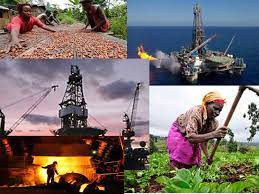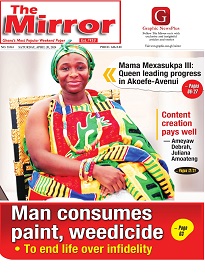The Mirror's Health , Lifestyle and Fashion

Ghana: a nation divided against itself
In 2021, Ghana had a population of 30.8 million. Most of the lands are fertile plains and savannah grass lands – well-watered by rivers and the man-made Volta Lake.
Advertisement
Ghana is rich in natural resources, such as cocoa, rice, coffee, cassava, peanuts, corn, shea nuts and banana and minerals, such as gold, diamond, silver, magnesium, bauxite and crude oil.
The country also has cattle, sheep, goats, pigs, chickens and fishes from rivers, the sea and fish ponds.
Ghana is rich in human resources with institutions of higher learning training middle- and higher-level professionals.
The country was colonised by Great Britain for 113 years and gained independence on March 6, 1957.
In 1960, the country, under Dr Kwame Nkrumah as President, changed its political status from a former colony to a republic and member of the Commonwealth of Nations.
Ghana has experienced, so far, five military takeovers – in 1966, 1972, 1978,1979 and 1981.
The Fourth Republican Constitution of 1992 that came into force on January 1993, established the foundation for the almost 30 years of peaceful democratic experiment that is ongoing.
Having agitated for and won independence from the United Kingdom in 1957, the struggle for economic independence and self-sufficiency has been elusive.
1957, the struggle for economic independence and self-sufficiency has been elusive.
The main cause is that the colonial economic structure and system inherited from the British largely remain the same.
The railway system remains confined to the coastal areas and a stretch that terminates in Kumasi, capital of the Ashanti Region.
Economic activity is confined, mostly, to the agricultural and commercial sectors.
The take-off stage at which the country can begin to industrialise and transform the bulk of its labour force from agriculture to the industrial and service sectors – is the main dream of far-sighted and well-meaning political leaders.
Dr Nkrumah had, undoubtedly, attempted a bold push for industrialisation.
However, the experiment did not succeed because it was done in a rush and under a state-owned economic model that contributed to the collapse of that dream.
The five military interventions also contributed to the failure of Ghana to broaden its democratic experience and to transform the economy.
One of the leaders of Ghana with the inclination to change the colonial economic model into a modern one is President Nana Addo Dankwa Akufo- Addo.
His plan is to launch an agricultural/industrial revolution aimed at shifting the country away from subsistence farming to large-scale agriculture under the Planting for Food and Jobs programme.
He also aimed at establishing at least one factory in each district to add value to the agricultural produce and mineral resources for export.
In his two-hour remarks on the state of Ghana’s economy in Accra on April 7, 2022, Dr Mahamadu Bawumia, Vice President, listed results of President Akufo Addo’s experiment in agricultural/ industrial revolution.
He stated that the Planting for Food and Jobs programme had been successful and had contributed to economic growth.
The agricultural programme has helped to increase the yield of Ghana’s chief cash crop, cocoa, to 1,047,385 tonnes in the 2020/2021 season, the highest in the country’s history.
On industrialisation, he said 106 factories had been completed and were operating and an additional 148 factories were being built.
According to Dr Bawumia, “the initiative represented the largest number of factories established under a government’s programme since independence”.

The country’s one-district, one-factory (1D1F) programme has attracted a number of top-class automobile companies to Ghana to put up vehicle assembly plants.
Volkswagen, Suzuki, Sino Trucks, Peugeot, Toyota and Nissan are among automobile companies that have built and are operating assembly plants in Ghana.
KIA, Hyundai and Renault were preparing to do the same in Ghana this year.
Home-grown vehicle assembly plant, Kantanka Automobiles, had been helped under the 1D1F programme to expand its operations.
The government had, also, begun to lay the foundation for an integrated bauxite and aluminium industry in the country.
According to Dr Bawumia, it was a major pre-occupation of the government to reduce import dependency, expand the economy, create jobs, increase exports and support the value of the cedi.
Certainly, Ghana is on the road to achieve its dream – to start an agricultural/industrial revolution that will transform the economy and pull Ghana out of the cycle of receiving aids and borrowing money.
Will Ghana’s fresh move for agriculturalisation and industrialisation of the country succeed?
Success or failure of the bold attempts to transform the country rest mainly on the nation’s political system.
Ghana is not a one-party state. Ghana’s political system is multi-party with two main parties taking their turn to govern.
One of the unfortunate demerits of the multiparty system in Ghana is that it is highly adversarial.
One party waits on its wings to take over power and rule for eight years.
There is a lack of national cohesion between the two main political parties and there is no common framework of national development to which the two parties are committed.
The National Democratic Congress (NDC) had prepared the Vision 2020 long-term development plan which it could not implement before it left office in 2000.
It was surprising that when an NDC President, Professor John Evans Attah Mills, took office in January 2009, until he passed away in July 2012, no reference was made to Vision 2020.
The John Mahama government drafted and commissioned a 40-year development plan that would have made it compulsory for successive governments to adopt.
The Akufo Addo government shelved that plan because it found it outlandish and unconstitutional.
A long-term development plan of that type was not necessary.
What is necessary is a broad framework that spells out main goals that serve as guide lines.
The framework should not be parochial but must have broad goals and aspirations that successive governments are willing to adopt and implement.
In this wise, the New Patriotic Party (NPP) – NDC political divide is undesirable and could lead to a national disaster.
Why is the NDC not enamoured about Ghana’s agricultural/industrial revolution under the government of Nana Akufo-Addo?
When Ghana is in financial crisis and could not borrow anymore from the European market, why was the NDC prepared to sabotage attempts by Ghana to come out of the financial crisis?
Why did the NDC block passage of the 2022 budget and put obstacles on the way of passing the Electronic Levy (E-Levy) in Parliament?
When the E-Levy legislation was passed in March 2022, why did the NDC head for the Supreme Court to get the passage overturned?
An old adage sums up the country’s economic and political dilemma this way – “a house divided against itself cannot stand”.
A nation that seeks to tear itself apart, at the least opportunity, cannot move on.
Coupled with the economic/political dilemma is a mass media, the Fourth Estate or National Watch Dog, that has failed to play the roles required of it in a developing country.
The mass and social media could have harnessed the benefits of the Information Super Highway of the Information Revolution to lead the way towards a nation united for common national goals.
Amid mass media pluralism, the private media in Ghana seeks to play the adversarial role in a one-sided and unprofessional way.
A well-performing mass and social media could have made a difference in the present economic/political dichotomy.
In the absence of true and dedicated professionalism, geared towards common national goals and aspirations, is it not necessary to re-engineer and re-tune the State-Owned Media (SOM), in consonance with the 1992 Constitution, to promote national development?
Email: [email protected]





